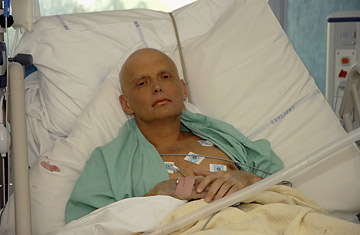
German authorities dropped the charges against Kovtun, due to lack of evidence for poisoning Alexander Litvinenko (pictured) in 2006.
The crime seemed straight out of a Cold War spy novel: A former Russian security agent turned fierce Kremlin critic starts causing problems for the Russian government. He falls seriously ill after drinking a cup of tea and suffers a grisly death. The police find traces of a radioactive substance forming a trail from Moscow to London.
What the story doesn't have — yet — is an ending. And that may prove difficult to write following the decision by German authorities on Thursday to close their investigation into one of the two lead suspects in the 2006 death of Alexander Litvinenko in London. Officials said there was not enough evidence to keep open the case against Dmitri Kovtun, a former Soviet intelligence officer who had been accused of smuggling the radioactive polonium-210 that killed Litvinenko from Moscow to London via Hamburg.
"This is a John le Carre plot," prosecutor Wilhelm Moellers said in Hamburg, referring to the famous British author of spy novels. "But we need facts to substantiate a lead. We did not find enough evidence to issue a warrant of arrest, or even file charges against Kovtun."
The development is a huge blow to investigators who have worked tirelessly for the past three years to try to solve Litvinenko's mysterious death —an incident that made headlines around the world and placed a significant strain on British-Russian relations. Britain has charged the other main suspect in the case, Andrei Lugovoi, who is now a parliamentarian in Moscow, but Russia has abjectly refused British attempts to have Lugovoi extradited.
"Naturally, the U.K. would have preferred us to come up with something else, but the German penal code has no provision for suspicions," Moellers tells TIME. "We could not prove Kovtun was carrying or had obtained the substance, or was in conscious possession of it, let alone intended to harm others. After all, he was visiting his family, which supports the assumption the substance was around without his knowledge. The German lead is dead."
In Russia, Kovtun praised the decision by the German authorities to drop the case, telling the Interfax new agency that he now expects the murder charges against Lugovoi to also be reconsidered. "[They] will all collapse like the Berlin Wall. Justice has won."
Before his death, Litvinenko had been a very public critic of then-President Vladimir Putin, accusing him of sanctioning the killing of Russian journalist Anna Politkovskaya. According to police, he met with both Kovtun and Lugovoi at London's Millennium Mayfair Hotel on Nov. 1, 2006, the day he fell ill. He was hospitalized and died three weeks later, accusing Putin of orchestrating his poisoning from his deathbed. German investigators later found traces of polonium-210 in Hamburg, where Kovtun had traveled days before his meeting with Litvinenko in London. Kovtun said he had been in Hamburg to visit his ex-wife.
Upon their return to Russia, both Kovtun and Lugovoi were also found to be suffering from radiation poisoning. Both men maintained their innocence, claiming that they had been exposed to polonium during their meetings with Litvinenko. Polonium-210 is so rare that producing enough of the substance to kill a man requires access to a high-security nuclear laboratory. Scientists at the British Atomic Weapons Establishment have traced the source of the polonium in Litvinenko's death to a nuclear power plant in Russia.
In the end, it seems as if Germany had little choice but to drop the case against Kovtun. British authorities could not supply concrete evidence tying him to Litvinenko's death. In fact, he was never even named a suspect in Britain's case against Lugovoi. Now, the question remains whether the decision to drop the case against Kovtun will doom Britain's already slim chances of convincing Russia to extradite Lugovoi. Litvinenko's widow, Marina, told the New York Times that she didn't think it would. "I'm not surprised," she said of the German decision. "I'm not disappointed."
But Russia doesn't appear ready to budge. British Foreign Minister David Miliband requested that Russia hand over Lugovoi during a visit to Moscow earlier this month — and again, Britain was rebuffed. But in a surprise move, Lugovoi said after the case against Kovtun was dropped that he wouldn't "rule out the possibility of meeting with British prosecutors" in London, but only "under certain conditions."
British officials may see this statement as pure posturing on Lugovoi's part. If he does follow through, however, another chapter to this mysterious saga could be written after all.
Download the new TIME BlackBerry app at app.time.com.
